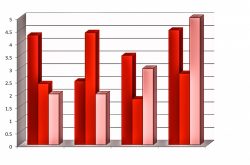Barnard’s SGA convened for their final spring meeting, and Barnard Bureau Chief Emerita Dassi Karp stepped in for one last time to cover the action. And it was a good one. Read on to learn what went down.
Remember me? It’s been a good few months since I wrote my last article, and it has certainly been a time. But I’m back to cover SGA’s last meeting of the semester. For a final hurrah, this meeting was somewhat lacking. There were no votes, no open floor, no protesters, barely any external announcements, no slideshows, and only minimal microphone shenanigans. But the longstanding recurring feature of the Barnard Student Government Association Representative Council meeting did not let us down. Yes, friends, you know what I’m talking about: administrative guests.
That’s right. After barely making quorum (“great, that’s seventeen, the exact right number” said Mia Lindheimer, VP Policy), thereby narrowly avoiding shutting down the meeting and ruining my dreams of tying off the loose ends of my senior year, our Reps welcomed Barnard’s Chief Operating Officer Robert Goldberg (remember when he was president and we never even came up with a good nickname?) and Vice President for Finance Eileen Di Benedetto.
These two are no strangers to Rep Council meetings. They were the first guests of the school year (if you don’t count the waste of time that was the alumnae panel), and have shown up pretty much every semester to remind students how the endowment works and what Barnard does with all the money we give them. This time, though, was a little different. There were no pie charts or bar graphs delineating spending. Instead, Goldberg spoke about some changes Barnard will be pursuing in the next year, as well as offered some updates about past topics.
- Bar graph.
It should not come as a surprise to anyone that tuition prices will be raised for the next school year. Exact numbers to be released shortly. Part of that expense just reflects normal developments, and part of it can be attributed to new efforts the College will be pursuing. Those efforts include:
- Changes in the dining hall. The effort to select Chartwells as Barnard’s new dining services provider was “probably the most student-driven I’ve ever seen,” said Goldberg. They will continue to involve students in the transition period. Meal plan offerings will not change next year, but they hope to continue discussions about how dining can best meet student needs in the years after that.
- Free laundry next year in all Barnard dorms. This is really a game changer. If I was still around, I would go back to separating my darks and my lights. My towels and sheets from my clothes. Hang dry from tumble dry? The possibilities are endless with unlimited machine use.
- Allocating Space in LeFrak. “This is a complicated issue,” said Goldberg, as the College has to balance the space needs of individual students, groups, faculty, and administration. They have hired an outside firm to help determine how best to use the space, and they will continue to work. “We don’t have an algorithm to weigh one [priority] over another,” he said. “Not everybody is going to be satisfied by this.” But they are sincerely working to meet the most urgent demands. For now, the space will remain as it is–the mostly empty study spaces and the new Muslim prayer space will stay, at least for the next while.
Goldberg also mentioned the College’s commitment to exploring big-picture ways to address the problem of prohibitive textbook and other course costs. “No student should have to choose a course based on whether they can afford the materials,” he said.
Listen, I’m not going to get nostalgic here, but this really was one of the more effective and informative SGA meetings I’ve ever attended. Nobody got into petty disagreements, no one used the terms “across the street,” and I have not heard the specifics of most of the information presented before.
Someone asked me recently if I thought it was a bad thing that on a campus that is so politically active there is such low participation in student council elections and so little interest in what they do. I don’t think that’s a problem though. SGA does some important things, sometimes. I still think that most of the information they get out of their various guests could better be relayed in a two-line email. I think what this and other student leadership opportunities do is allow us to practice and refine the skills of real leadership once we leave campus. So if you’re politically active, don’t waste your time over here. Don’t kid yourself into thinking that what happens at Columbia is that important, there more important than other things happening in our neighborhood and in the world. There are better things to spend your efforts on, places where your energies can be better used.
Thanks, SGA, this has been a whole lot of fun. Looks like some good changes are in the works. Try not to mess things up.
Graph via Bwog Archive


 1 Comments
1 Comments
1 Comment
@Bae A touching article, the perfect balance between joy and solemnity.
But where are my hashtags?